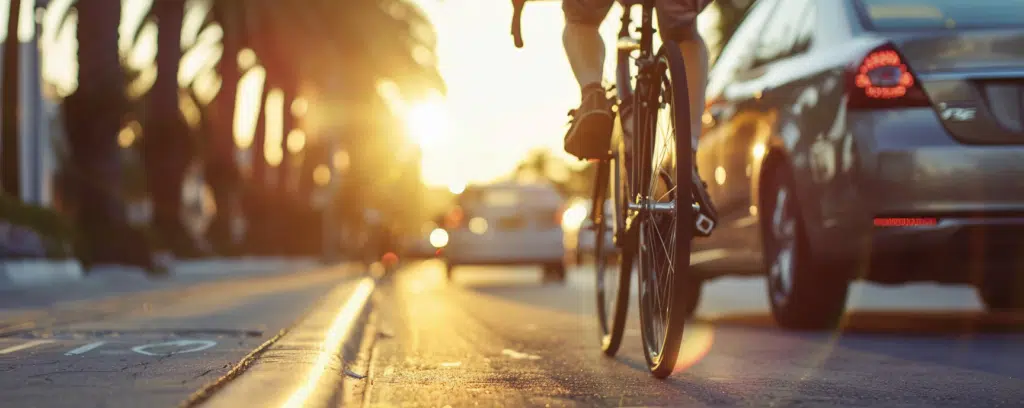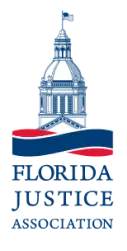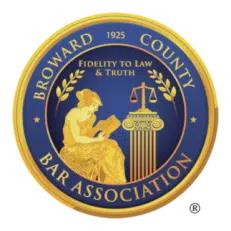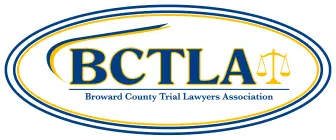
In Florida, hitting a cyclist can result in severe legal penalties. These can range from fines and misdemeanors to felonies with significant prison time, especially if the accident results in injury or death. This article outlines the specific legal consequences, reporting requirements, and share-the-lane laws that apply in such cases, addressing the question of “What is the penalty for hitting a cyclist in Florida?”
Key Takeaways
- In Florida, hitting a cyclist can lead to serious legal consequences, including felony charges, prison time, fines, and long-term impacts on driving privileges, especially if the driver leaves the scene or is under the influence.
- Florida law requires motorists and cyclists to share the road responsibly, with specific rules like giving cyclists at least three feet of clearance when passing and adhering to general traffic laws.
- After a bicycle accident, Florida mandates reporting the incident under certain conditions, and determining fault hinges on negligence, with the potential for cyclists to seek various types of compensation for injuries or wrongful deaths.
Legal Consequences for Hitting a Cyclist in Florida
Hitting a cyclist with your car is a serious matter in Florida, with strict legal obligations and severe penalties if not handled correctly. Here are some important steps to follow and what happens if you hit a cyclist with your car:
- Remain at the scene of the accident. Hit-and-run charges can be imposed if you choose to flee.
- The Aaron Cohen Life Protection Act mandates a minimum of four years in prison if the cyclist dies, underscoring the gravity of such incidents.
- Even if the accident only causes property damage, failing to stay can still result in a second-degree misdemeanor, with potential jail time and fines.
For cases involving personal injury, the penalties intensify. Drivers can face second or third-degree felony charges, which carry up to five years in prison and fines reaching $5,000. If the driver was under the influence, the mandatory minimum sentence is two years in prison. Additionally, leaving the scene can result in long-term consequences such as driver’s license revocation for a minimum of three years.
Beyond these immediate legal repercussions, drivers may also face charges of reckless driving or aggravated battery with a deadly weapon, which can lead to serious injuries. These charges can significantly impact one’s criminal record and future driving privileges. Understanding these consequences highlights the importance of adhering to traffic laws and remaining at the scene to provide necessary assistance to the injured cyclist.
Share-the-Lane Laws and Obligations in Florida

Motorists have specific obligations under Florida’s share-the-lane laws. Drivers must give cyclists at least three feet of clearance when passing and ensure it is safe to move into an adjacent lane before doing so. This law aims to prevent close encounters that can lead to accidents. Moreover, motorists should yield to cyclists as they would to other vehicles, avoiding underestimating their speed to prevent turning in front of them.
Cyclists also have the right to:
- Leave the bike lanes when switching lanes to avoid hazards or if the lane is too narrow for both a car and a bicycle
- Ride on the right-most side of the road if no bike lane is available
- Ensure their actions are predictable to other road users
These laws play a significant role in fostering a safe environment for all road users, as they ensure that everyone follows the same rules.
Reporting Requirements After a Bicycle Accident
In the aftermath of a bicycle accident, Florida law mandates reporting in specific circumstances. A Florida Traffic Crash Report is required for any crash involving bodily injury, death, or property damage amounting to at least $500. This report serves as a formal record of the incident, vital for subsequent legal or insurance processes.
For more serious accidents resulting in death, personal injury, or inoperable vehicles requiring a tow, a ‘long form’ police report is mandatory. Even in less severe cases, it is advisable to report the accident to law enforcement to avoid disputes about the accident’s details later on. Filing a proper report safeguards both parties and facilitates accurate fault and compensation determination.
Determining Fault in a Bicycle Accident
Determining fault in a bicycle accident in Florida revolves around the concept of negligence. Both the cyclist and the motorist must act with reasonable care. If a cyclist can prove the driver was negligent, they can hold the driver liable for damages. Cyclists may also be deemed at fault if they have broken traffic laws or have operated their bikes negligently or recklessly. This means that they can bear some responsibility in certain situations.
Florida follows a modified comparative fault rule, which means:
- A party can only recover compensation if they are less than 50% at fault for the accident.
- Under this system, the total compensation is reduced by the claimant’s percentage of fault.
- For instance, if a cyclist is found to be 30% at fault, their compensation will be reduced by that percentage.
- This rule ensures that both parties are held accountable for their actions.
Let's Settle For More... Get Your FREE Case Review Today.
Let's Settle For More... Get Your FREE Case Review Today.
Types of Compensation for Injured Cyclists
Injured cyclists in Florida can seek compensation for various types of damages through bicycle personal injury claims. These compensations are generally categorized into:
- Economic damages: cover out-of-pocket expenses such as medical bills, emergency care costs, and lost wages.
- Non-economic damages: address the physical pain and mental suffering resulting from the accident.
- Wrongful death claims: applicable in cases where the cyclist has died as a result of the accident.
For families of cyclists who tragically lose their lives in accidents, wrongful death claims offer a means to seek compensation for their loss. These claims can cover funeral expenses, loss of companionship, and other related costs. Comprehending these types of compensation can assist victims and their families in effectively dealing with the aftermath of a bicycle accident.
Economic Damages

- Emergency medical evaluations
- Surgery
- Prescription medications
- Physical therapy costs
Additionally, future medical expenses necessary for ongoing treatment, such as future surgeries and the cost of medical equipment like wheelchairs, fall under economic damages.
Victims can also claim compensation for lost wages if the injury resulted in missing work. This includes both the immediate loss of income and any future earnings lost due to long-term disabilities caused by the accident. Physical property damage, such as a destroyed bike or damaged personal belongings, is also covered under economic damages.
Non-Economic Damages
Non-economic damages compensate for the less tangible effects of an accident, such as physical pain, mental suffering, and emotional distress. These damages can be significant, as they address issues like anxiety or fear developed after the accident, which can impact the victim’s enjoyment of biking and other activities.
Additionally, non-economic damages may include compensation for the loss of enjoyment of life and loss of consortium, which refers to the loss of companionship and support from a loved one. These damages recognize the profound impact that a serious injury can have on a person’s quality of life and relationships.
Wrongful Death Claims
In the unfortunate event of a cyclist’s death in a traffic accident, Florida law allows the family to file a wrongful death claim. These claims can seek compensation for various types of damages, including loss of companionship and support. Families can also recover costs associated with funeral and burial expenses.
Wrongful death claims are designed to provide financial relief to the surviving family members, helping them cope with the emotional and economic impact of their loss. These claims acknowledge the profound void left by the deceased and aim to offer some measure of justice and recompense.
The Role of Car Insurance in Bicycle Accidents
Car insurance plays a pivotal role in covering damages and injuries resulting from bicycle accidents. Liability insurance, for instance, can cover a cyclist’s property damage and bodily injury if the driver is found at fault. Uninsured Motorist (UIM) coverage is particularly useful in cases where the other driver lacks sufficient insurance to cover the damages.
Medical payment coverage (Med Pay) can also be beneficial, as it covers medical bills, including hospital bills if a cyclist is hurt in a hit-and-run accident. The insurance limits of the at-fault party’s policy can significantly affect the compensation received, and additional insurance coverage like homeowner’s or renter’s insurance might also come into play.
Understanding these insurance roles can help victims navigate the aftermath of an accident more effectively.
Steps to Take After Hitting a Cyclist
If you hit a cyclist in Florida, it is essential to adhere to specific steps to abide by the law and evade severe penalties. Here are the steps you should follow:
- Stay at the scene of the accident, as fleeing can lead to serious legal repercussions under the Aaron Cohen Life Protection Act.
- Provide necessary assistance to the injured cyclist.
- Call emergency services if needed.
Document the scene, gather witness information, and file a police report to ensure all details are accurately recorded. These steps not only comply with legal requirements but also protect you and the injured party.
How a Bicycle Accident Attorney Can Help You
A bicycle accident attorney can be a significant ally in dealing with the aftermath of an accident. They can:
- Help gather crucial evidence such as police reports, accident scene photos, and witness statements
- Build a strong personal injury claim by proving the other party’s negligence
- Effectively communicate and negotiate with insurance companies on your behalf
- Ensure that you receive the compensation you deserve
Moreover, a lawyer brings experience and knowledge of bicycle accident law to maximize your compensation. They know how to calculate both special and general damages, including medical bills and emotional distress. If a fair settlement can’t be reached, an attorney can take the case to trial, providing the legal expertise needed to navigate the complexities of the legal system. To get started, consider scheduling a free consultation with a qualified attorney.
Penalties for Failing to Follow Traffic Laws
Failing to follow traffic laws can have serious consequences, particularly when it results in a bicycle accident or pedestrian accident. Drivers found to have violated traffic laws, such as:
- running a red light
- not yielding
- speeding
- distracted driving
These examples can be deemed negligent and held responsible for damages. This negligence is a critical factor in determining fault and liability in a bicycle accident case.
Specific examples of traffic violations that commonly lead to accidents include speeding, distracted driving, and failing to signal when turning. These actions not only increase the risk of accidents but also carry legal repercussions that can significantly impact a driver’s record and liability. Acknowledging these penalties emphasizes the significance of complying with traffic laws to guarantee the safety of all road users.
Preventing Bicycle Accidents
The prevention of bicycle accidents necessitates alertness and accountability from both motorists and cyclists. Motorists should avoid using high-beam headlights when approaching or passing bicyclists, as this can blind them and increase the risk of an accident. Cyclists should wear bright clothing and reflective gear, especially at night, to increase their visibility on the road.
Proper bike maintenance and predictable riding are also crucial for cyclists. Riding a bike that fits properly and is in good working condition can prevent mechanical failures that lead to accidents. Both drivers and cyclists should avoid distractions like texting and listening to music, which can take their eyes and ears off the road, increasing the risk of accidents.
Frequently Asked Questions
What should I do immediately after hitting a cyclist with my car?
Immediately after hitting a cyclist with your car, stay at the scene, provide assistance, call emergency services, document the scene, gather witness information, and file a police report to comply with legal requirements and protect both parties involved.
What are the legal consequences if I leave the scene after hitting a cyclist?
Leaving the scene after hitting a cyclist can lead to serious charges such as hit-and-run, which may result in prison time, hefty fines, and driver’s license revocation. It’s crucial to stay at the scene and provide assistance.
How is fault determined in a bicycle accident?
In bicycle accidents, the fault is determined based on negligence, with the percentage of fault affecting the compensation under Florida’s modified comparative fault rule. Cyclists need to prove driver negligence while accepting some fault if applicable.
What types of compensation can injured cyclists seek?
Injured cyclists can seek economic damages, non-economic damages, and in fatal cases, wrongful death claims, including loss of companionship and funeral expenses.
How can a bicycle accident attorney help me?
A bicycle accident attorney can help you by gathering evidence, negotiating with insurance companies, calculating damages, and maximizing your compensation, providing legal expertise, and taking your case to trial if necessary.
Last updated Wednesday, September 18th, 2024






